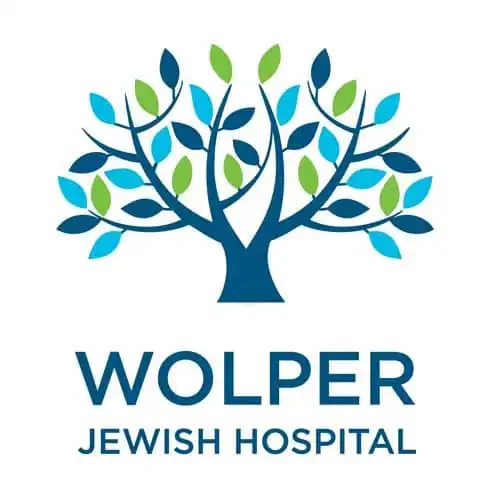Everyone at Wolper is committed to ensuring our patients receive the very best of care.
Please read through the information below to ensure you have all the information you need to make your admission to Wolper as comfortable as possible.

Wolper Jewish Hospital’s facilities and services include:
- Sub-acute medical inpatient services
- Specialist palliative care services
- Onsite pharmacist
- Inpatient rehabilitation
- Day (outpatient) rehabilitation
- Hydrotherapy pool and physiotherapy gym
- Allied health services such as physiotherapy, hydrotherapy and occupational therapy
- Discharge planning
- MoveWell community exercise program
All 57 rooms within the Hospital are private and well equipped, offering a modern ensuite, air-conditioning, internet and entertainment facilities.
Our library, outdoor terraces and landscaped garden provide areas for visits, relaxation and reflection.
There is free parking within the Hospital grounds and also in the surrounding streets. All food is prepared with the advice of our consultant dietition and is strictly kosher. Shabbat and all Jewish festivals are celebrated with traditional foods and special events.


Patients are required to bring:
- Medicare, private health fund membership and any relevant entitlement cards.
- List of current medications and dosage information. Medications must be in date and in their original boxes.
- Comfortable day clothes, shoes (not scuffs) and night attire.
- Comfortable clothing and shoes for exercising
- Front buttoning clothes (for people with upper limb issues).
- Swimming attire (for patients participating in hydrotherapy).
- Personal toiletries.
- Current x-rays or scans.
Please leave all valuables at home. Wolper does not accept responsibility for loss of valuables.
Our kosher food service
Nourishing meals are vital to our health and wellbeing which is why our kitchen staff work in close consultation with our dietitian to produce menus that are delicious and that meet the needs and preferences of our patients. All ingredients used in the kitchen at Wolper are kosher certified and supplied by Food Safe approved suppliers.
Kosher means “fit” or “suitable” in Hebrew and refers to the body of Jewish law dealing with the foods Jews can or cannot eat and how those foods must be prepared and eaten. These food laws form a vital and integral component of Jewish life.
Wolper is the only strictly kosher hospital in Australia and this unique environment requires your cooperation.
In order to maintain control of this environment we must restrict food and drinks being brought into the Hospital. This means that no food or drink (including coffee) is to be brought into the Hospital. The only exception is whole fresh fruit, which has not been cut.
Our coffee cart is located on the ground floor serving kosher hot and cold beverages as well as bagels, wraps, pastries and other snacks.

Clinical Handover & Communication
We encourage our patients to be actively involved in their care. Clinical handover takes place whenever there is a transition in care. A standardised approach is used which facilitates safe and accurate communication and coordination of care.
Bedside handover occurs at least once every 24 hours. Patients are encouraged to ask questions so that they are informed about their medical condition, about the care they are receiving and their care options. With your consent, we are happy for loved ones/carers to be present during bedside handover. Bedside handover provides staff with the opportunity to work in partnership with their patients so that information can be validated and clarified with patients/carers as required. Patient goals and preferences are also considered.
During the bedside handover process, staff will also be performing a safety scan of the patient room to ensure the patient’s call bell and mobility aids are within reach.
Accessing safe healthcare
Please see this document produced by the Australian Commission on Safety and Quality in Health Care for tips on accessing safe healthcare
Escalating Care – R.E.A.C.H.
We know that you know yourself, or your loved one best. This is why we want you to let us know if you notice a worrying change.
R.E.A.C.H. is a communication process which will help you share your concerns with the staff caring for you or your loved one.
In this situation, please REACH out to us:
- Recognise – You may recognise a worrying change in your condition or the person you care for.
- Engage – Engage (talk) with the nurse or doctor. Tell them your concerns.
- Act – Ask the nurse in charge for a “clinical review”. This should occur within 30 minutes.
- Call – If you are still concerned call for further assistance by pressing the patient call bell.
- Help is on its way.
There are flowcharts on escalating care in every room and all patients are given a REACH brochure in their information pack on admission.
Health Literacy
Health literacy plays an important role in enabling effective partnerships. For partnerships to work, everyone involved needs to be able to give and receive, interpret and act on information such as treatment options and plans. Health literacy is about how people understand information about health and health care, and how they apply that information to their lives, use it to make decisions and act on it. Health literacy is important because it shapes people’s health and safety and quality of health care. Please see this infographic attached on Health Literacy for consumers
Useful Resources

Parking
Free parking is available in the Hospital car park as well as in the surrounding streets.
Public Transport
The Hospital is easily accessible by bus (route 200) and train (Edgecliff and Bondi Junction railway stations).
- Train to Edgecliff station, with a 10/15 minute walk up Ocean Street and left into Trelawney Street.
- Bus 200 runs up Ocean St from Edgecliff train station (dropping you at the corner of Trelawney Street).
- Train to Bondi Junction – Bus 389 will drop you off on the corner of Ocean and Queen Streets with a 5 minute walk to the Hospital.
- Bus 389 runs from Elizabeth Street in the City to Queen Street. Wolper is a 5 minute walk from here.
With their doctor’s approval, patients are able to leave their ward for short periods.
Patients must advise the nurse caring for them before leaving the ward as they will need to sign a leave form.
All patients must be accompanied by an adult family member or friend when leaving the ward.
Wolper is a non-denominational hospital and welcomes all people regardless of religion or creed.
Rabbis from a number of different synagogues visit the Hospital regularly offering religious counsel, advice and assistance.
Hospital staff can arrange for other Rabbis or ministers of any religion to attend the Hospital. This can be arranged by speaking to our nursing staff.

Our multidisciplinary team ensure a safe, well-coordinated discharge. Discharge planning commences on the day of admission and patients and their families/carers are encouraged to be involved in the process.
The multi-disciplinary team will determine when additional professional assistance is required in consultation with the patient and their family/carer and then refer onto the appropriate organisation. Our discharge planner and/or social worker will liaise with the patient and their family/carer as needed.
What happens after my discharge from Wolper Jewish Hospital?
The multi-disciplinary team will arrange follow up therapy as required. This may be at Wolper or elsewhere depending on the treatment needed and the patient’s discharge destination.
For those able to continue to attend treatment at Wolper, we offer Day Rehabilitation, MoveWell community exercise classes and private physiotherapy/exercise physiology.
The Day Rehabilitation program runs for three to six weeks and usually requires three hours of participation at each appointment. The tailored program will include at least three forms of therapy being physiotherapy, hydrotherapy and an education session with either an occupational therapist or exercise physiologist.
Once the Day Rehabilitation program has been completed, fitness can be maintained by attending our MoveWell exercise classes, which include classes such as aqua-Move, tai chi, strength and conditioning as well as falls prevention and balance.
On admission to Wolper Jewish Hospital, patients are requested to sign an Informed Financial Consent form which provides an estimate of fees and charges that may be accrued while in hospital. Patients are liable for all hospital charges until the details of their health insurance are confirmed.
It is very important that patients approach their admission to hospital well informed of the financial consequences. Please read the following information and talk to our admissions staff regarding any concerns or queries.
Privately insured patients
Please confirm the following details with the relevant health fund prior to admission:
- Is there an “excess” payment on the insurance policy?
- Are there any co-payments required for each night in hospital?
- Does the policy exclude some treatments, for example cardiac, orthopaedic or rehabilitation?
Please note that if the patient has been a member of the health fund for less than 12 months the fund may not accept liability for the costs of the admission, eg if the patient’s condition or any symptoms of their condition existed prior to joining the health fund. Any excess will be required to be paid on admission.
Claims for hospitalisation will be made directly to the patient’s fund. An account will be issued for any outstanding balance not covered by the fund. Depending on the health fund, some ancillary items may appear separately on our hospital account. Patients will be required to pay the account upon discharge.
Costs not covered by health funds include:
- Pharmacy – medicines for pre-existing conditions, certain medicines required during the admission and discharge medications (varies between health funds).
- Pathology (eg blood tests).
- Imaging or x-ray including ultrasound.
- Purchase or rental of mobility aids such as walking sticks.
- Equipment such as over-toilet aids and cushions.
Please check with the relevant health fund for full details.
Veterans & War Widows
Eligible veterans and war widows’ accounts will be forwarded to the Department of Veterans’ Affairs for payment.
Work Cover & Third Party patients
Patients should supply insurer details and claim numbers, as we require written approval before admission.
Methods of payment
Wolper accepts the following forms of payment:
- Cash
- Cheque
- Credit card (Visa, MasterCard, AMEX)
- EFTPOS

If any aspect of your stay at Wolper is not satisfactory please advise the nurse in charge. The staff at Wolper takes pride in providing excellent care and strives to ensure you have a comfortable stay.
At Wolper Jewish Hospital we welcome your feedback. We encourage you to complete a Patient Feedback form which is included in your patient information pack. All comments from these forms, both positive and negative, are considered at department and management level and acted upon as appropriate.
If you have a formal complaint, please address it to the General Manager/Director of Clinical Services at ge************@********om.au
Unresolved complaints may be directed to the Health Care Complaints Commission. Telephone 1800 043 159 or (02) 9219 7444.









